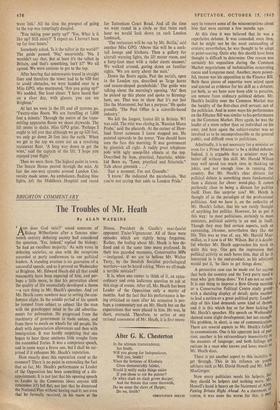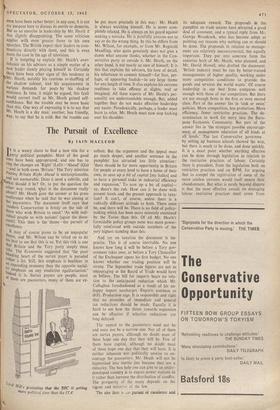BRIGHTON COMMENTARY
The Troubles of Mr. Heath
By ALAN WATKINS
° AND does God exist?' asked someone of IABishop Wilberforce after a famous nine- teenth century debating society had considered the question. 'Yes, indeed,' replied the bishop: 'he had an excellent majority.' As with votes in debating societies, so also with the receptions accorded at party conferences to our political leaders. A standing ovation is no guarantee of a successful speech; and so it proved on Wednesday at Brighton. Mr. Edward Heath did all that could reasonably have been expected of him, and per- haps a little more, in that his peroration about the quality of life successfully developed a theme —a rare thing in Mr. Heath's speeches. And yet Mr. Heath came nowhere near to setting the con- ference alight. In the middle period of his speech he jumped from subject to subject like the man with the grasshopper mind in the old advertise- ments for pelmanism. He progressed from the machinery of government to trade unions, and from there to meals on wheels for old people. He dealt with depreciation allowances and then with immigration. It was hardly surprising that one began to hear those ominous little coughs from the assembled Tories. It was a competent speech, and in some ways a brave one, but I shall be sur- prised if it enhances Mr. Heath's reputation.
How exactly does this reputation stand at the moment? There is no point in concealing the fact that so far, Mr. Heath's performance as Leader of the Opposition has been something of a dis- appointment. It is not just that his opening speech as Leader in the Commons (does anyone still remember it?) fell flat; not just that he dismissed the National Plan without having read it; not even that he formally received, in his room at the House, President de Gaulle's near-fascist opponent Tixier-Vignancour. All of these were episodes which are rightly being forgotten. Rather, the feeling about Mr. Heath is less de- fined and at the same time more profound. In their less guarded moments, Conservative MPs —instigated, if we are to believe Mr. Walter Terry,, by the fiendish Socialist psychological warriors—can be heard asking, 'Have we all made a terrible mistake?'
It is, when one comes to think of it, an extra- ordinary and even ludicrous question to ask at this stage of events. After all, Mr. Heath has been Leader of the Opposition only a matter of months. And the fact that his performance is be- ing criticised so soon after his accession is per- haps a commentary not on Mr. Heath but on the expectations that were placed in him. He was, in short, oversold. Therefore, to arrive at any rational assessment of Mr. Heath, it is first neces-
sary to remove some of the misconceptions about him that were current a few months ago.
At this time it was believed that he was a superlative debater. It was conceded, even then, that he might not be the most outstanding of orators; nevertheless, he was thought to be adept at point-scoring. Quite why this should have been thought is difficult to determine. One reason was certainly his exposition during the Common Market negotiations of technicalities concerning cocoa and kangaroo meat. Another, more power- ful, reason was his opposition to the Finance Bill. Both these pieces of expertise were seized upon and quoted as evidence for his skill as a debater; yet both, as we have now been able to perceive, are remote from ordinary political debate. Mr. Heath's lucidity over the Common Market was the lucidity of the first-class civil servant, not of the politician. And in some ways his performance on the Finance Bill was similar to his performance on the Common Market. Here again, he was the leader of a team rather than an individual on his own; and here again the subject-matter was so involved as to be incomprehensible to the general public, and difficult even to politicians.
Admittedly, it is not necessary for a minister or even for a Prime Minister to be a skilled debater. Indeed, it is arguable that a minister may be better off without this skill. Mr. Harold Wilson may well spend too much time in thinking up jokes, and not enough time in running the country. But Mr. Heath's clear distaste for political debate is something more fundamental than a distaste for clever word-play. It comes perilously close to being a distaste for politics itself. Does this surprise you? Mr. Heath is thought of as the paradigm of the professional politician. And we have it, on the authority of Mr. Heath's father, that his son rarely thought of anything but politics. However, let us put it this way: to most politicians, certainly to most ministers, political activity is an end in itself. Though they may find certain aspects, such as canvassing, irksome, nevertheless they like the life. This was as true of, say, Mr. Harold Mac- millan, as it now is of Mr. Wilson. But it is doubt- ful whether Mr. Heath approaches his work in quite this way. One gets the impression that political activity as such bores him, that all he is interested in is the end-product; as his admirers would put it, 'he likes to get things done.'
A persuasive case can be made out for saying that both the country and the Tory party need a man who 'gets things done.' Yet I am not so sure.
It is one thing to impress a Bow Group meeting or a Conservative Political Centre study group with a dazzling display of detail; quite another to lead a nation or a great political party. Leader- ship of this kind demands some kind of theme,
and it is this which has so far been lacking in Mr. Heath's speeches. His speech on Wednesday showed some slight development, but not enough• His problem, in short, is one of communication' There are several aspects to Mr. Heath's failure to communicate. One is his apparent lack of pas• sion; another is his extraordinary insensitivity to the nuances of language; and both failings are curious in a man who knows and loves music as Mr. Heath does.
There is yet another aspect to this inability to get through. This in his reliance on young advisers such as Mr. David Howell and Mr. John MacGregor.
Now every politician needs his helpers, !Int' they should be helpers and nothing more. Mr' Howell's hand is heavy on the Statement of Al Putting Britain Right Ahead. As a statement, course, it was none the worse for this; it may even have been rather better; in any case, it is not my purpose here to discuss its merits or demerits. But as an exercise in leadership by Mr. Heath it Was slightly disappointing. The same criticism applies with even greater force to his own speeches. The British expect their leaders to com- municate directly with them, and this is even more the case in the age of television.
It is tempting to explain Mr. Heath's over- reliance on his advisers as a simple matter of a new leader slowly playing himself in. Certainly there have been other signs of this tendency in Mr. Heath, notably his cautious re-shuffling of the shadow cabinet, and his acquiescence in various demands for posts by his shadow ministers. In time, it might be argued, this fault would correct itself as Mr. Heath gained self- confidence. But the trouble may be more basic than this. One way of expressing it is to say that Mr. Heath is a shy man; another, less friendly, Way, to say that he is cold. But the trouble can
be put more precisely in this way: Mr. Heath is always watching himself. He is never com- pletely relaxed. He is always on his guard against making a mistake. He is painfully anxious not to say or do the wrong thing. In this he differs from Mr. Wilson, for example, or from Mr. Reginald Maudling, who quite genuinely does not give a damn what anyone thinks, whether in the Con- servative party or outside it. Mr. Heath, on the other hand, is not nearly so sure of himself. It is this that explains his advisers, his love of detail, his reluctance to commit himself—for fear, per- haps, of appearing foolish—to any large theme for any length of time. It also explains his extreme readiness to take offence at slights, real or imagined. All these aspects of Mr. Heath's per- sonality are understandable enough. But, added together they do not make effective leadership any easier. Paradoxically, perhaps, a leader must learn to relax. Mr. Heath must now stop looking over his shoulder.







































 Previous page
Previous page